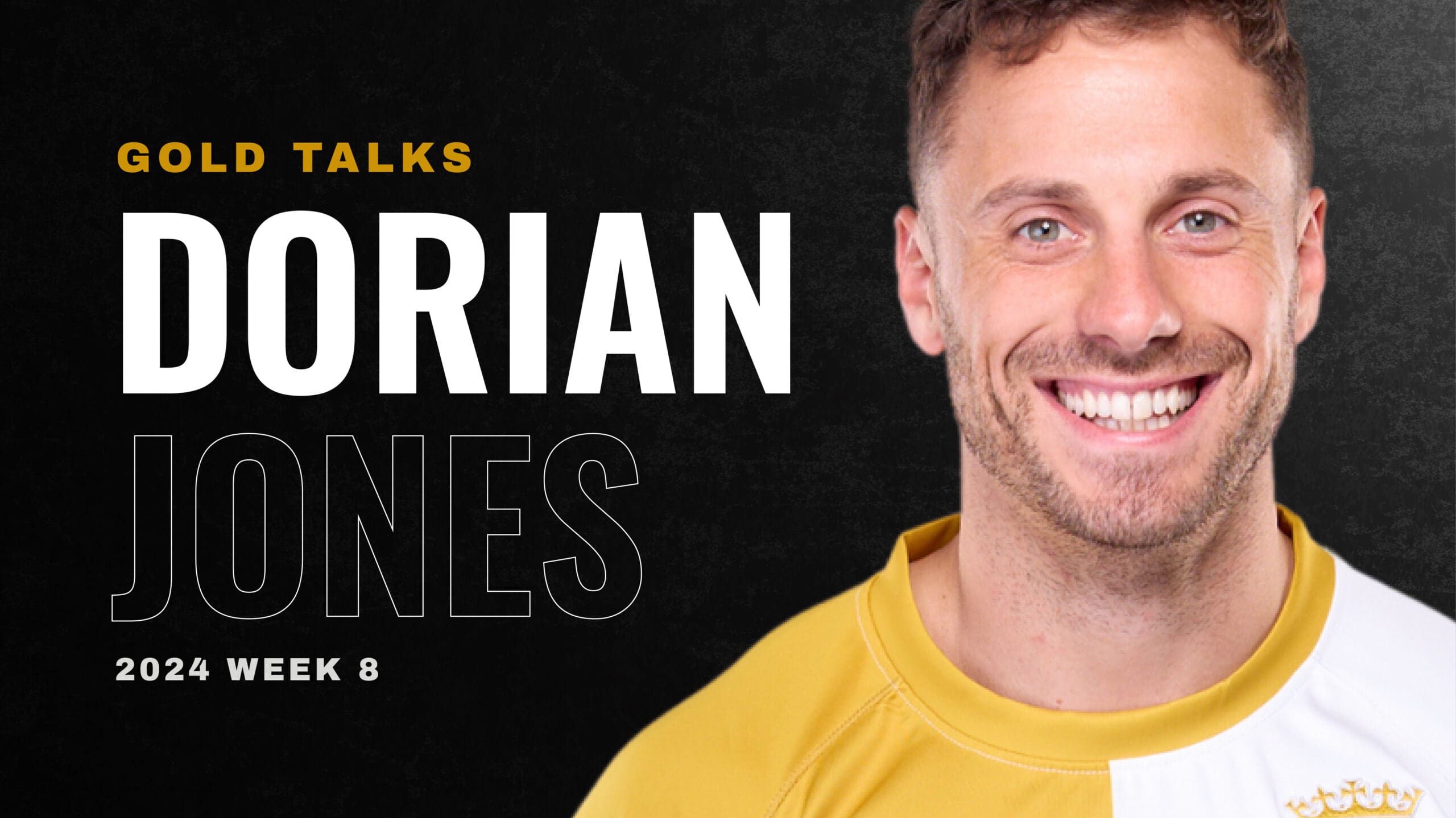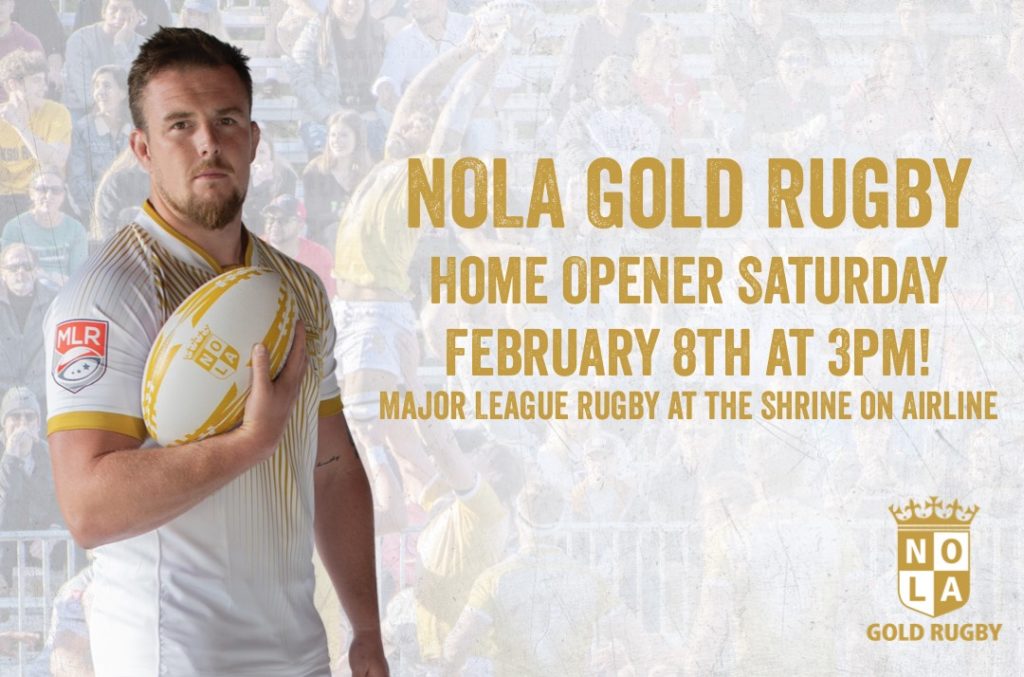

In the heart of New Orleans, where the vibrant culture meets the fierce passion of sports, NOLA GOLD rugby player Dorian Jones stands as a testament to both the local spirit and the global appeal of rugby. Dorian, a seasoned athlete with an impressive career spanning various international pitches including Newport Gwent Dragons, brings a wealth of experience and insight to the MLR (Major League Rugby). We sat down with Dorian to discuss his journey through the world of rugby. He shares his experience transitioning from playing in Europe to the MLR, and the potential of rugby as a core part of American sports culture. Dorian also opens up about the personal challenges and triumphs of his career, offering a candid look at the life of a professional rugby player.
Q: You’re a Welshman. What does the Wales national team need to do to compete with the likes of Ireland or France and be the best in Europe?
A: I think there’s a lot of work that needs to go in that goes right back to school rugby and mini rugby. We need to invest in that. There’s a big drop in the level between regional rugby and the level below that…if you don’t play for your region, you play club, but some players there may have to work a full-time job. The level in that case, isn’t high enough. There’s also the issue of how we keep our players in Wales — some outstanding players are playing outside of Wales. Much of it comes down to money, and it’s tough to compete with the more prominent countries like France. The one love that every Welshman has, though, is rugby, and the passion will always be there; I’m confident we’ll get there eventually. I think it’s a deeper plan rather than just tactics or squad selections at the national level.
Q: You’re a Newport Gwent Dragons legend in terms of appearances and statistical accolades. Was it difficult to move on in your career? What prompted that change?
A: It was my home region, so I loved playing for the Dragons. I played with a lot of my boyhood friends. In truth, I could have happily stayed there and played the rest of my career there. A new coach came in and cleaned the house, and I wasn’t in his plans. I was in the prime of my career, so I felt that I deserved to be playing. I had an opportunity to play in France, which I took. It was an amazing experience; not just for rugby, but also for my life.
Q: Like many players in this squad, you’re well-traveled, having played in France as well. What did you learn during your time there?
A: French people are really proud of their culture and language, so I learned about their culture and also reflected on my own. They’re so passionate about their sport, their food, their language, and, of course, their rugby. I didn’t think a country could be as supportive as Wales, but for every home game, the entire village filled the stadium. You can’t go to the supermarket without someone talking to you about the game. They’re so invested, and they love the game so much.
Q: Obviously, we’re not at that level in the MLR quite yet. What are some steps the league should take to make rugby a core part of American sports culture?
A: I think in the MLR, there’s a lot of focus on statistics and numbers. It’s a different rugby to anything I’ve played before. There’s a lot of stop-start, which is akin to football. The rugby that I’m used to is much quicker. I think the main thing to grow rugby in the States is the foundation. When you go to the park, you see people playing football or baseball; if we can get rugby into schools and promote it, that would go a long way. A big focus at NOLA Gold is getting our players out there to help develop the skills and understanding of the players and local coaches. This is something we see is working really well in New Orleans.
Q: Let’s recap the game against San Diego quickly. I don’t want to discredit or disregard any of the good rugby that we played. In your estimation, what did we do well?
A: I think we executed the game plan that we prepared really well, especially in the first half. We did take chances. We took opportunities when they were there, but we also missed chances.
Q: Is San Diego a difficult environment to play in compared to others you’ve experienced this season?
A: It was my first away game, so it’s tough to judge, but I think it was a great environment. That’s why people play professional rugby—to play in those big stadiums against the big teams. I can imagine that for younger players, it may be a bit daunting. I think we got the perfect start, though—going 17-0 up in the first half and silencing their home crowd. It put some doubt in the opposition.
Q: Something that other players have told me this season is we’re still waiting for an 80-minute performance. What do you think we need to do to achieve that?
A: It’s definitely something we haven’t proven yet; if we knew the answer, it would be done by now. I think a focus is how we get our momentum back since we lost some of it in the second half. We also need to look at our fitness levels to see if we can sustain our style of play for a full 80.
Q: Tell me about momentum in rugby and how it may have manifested in the game against San Diego.
A: When things are going right, it feels like you’ve got an extra energy that you didn’t have before. It gives everyone a little step forward and extra speed. When you lose it, though, you may start feeling a bit negative. There’s a weight on your shoulders. The key is finding a way to get that weight off our shoulders and executing on the little details, even when it’s tough.
Q: Looking ahead, we have the Miami Sharks at home this week. It’s a short week of preparation, given the travel — what will training look like over the next three days?
A: We’re straight back in today. We did a great review on [Monday] of the San Diego match and we’ve now put it to bed. We get back to NOLA mid-day [Tuesday] and will start putting together a plan for Miami. We may have lost half a day, but when you have these short turnarounds, you do your extra work and make up for it.
Q: You can’t underestimate any team in this league. What makes Miami dangerous as a side?
A: They’re definitely hungry. They play with a lot of ambition and physicality. You can see that when they play—the Argentinian boys, the Uruguayan boys,and every squad member—they play physically, so we know we’ll have to front up physically.
Q: What’s on the playlist to get you hype for a matchday?
A: I don’t listen to music. I’d rather be open throughout warmups so that players can come up to me and ask about assignments. This is due to the position I play [fly half]…I need to direct the game, so I want to be available for the other guys before the game. I also don’t want to be head-butting walls in warmups since I need to be calm and composed during the game.
Q: If you want GOLD fans to remember one thing about you, what would it be?
A: As a person, I’m honest and approachable. I like to interact with people. Some people look at rugby players like big stars, but we’re just like everyone else in the stands. I think that’s important for everyone to know.
NOLA GOLD is back in the win column after a massive result
Born in Oakland, California, with roots stretching back to Tonga, Moni Tongauiha
New Orleans, LA -- The slide continues for NOLA GOLD, as they
In the heart of New Orleans, where the vibrant culture meets the
San Diego, CA -- NOLA GOLD fell to the San Diego Legion
